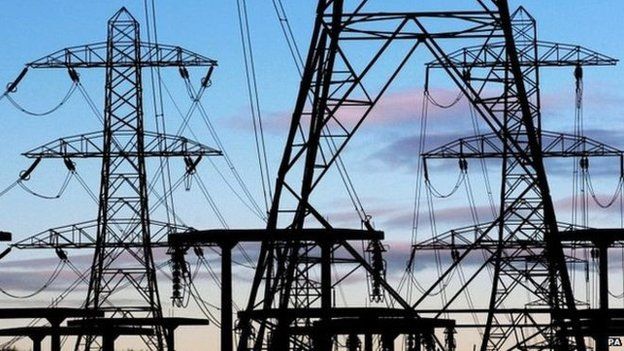Electricity blackouts risk up, says National Grid
- Published

The risk of blackouts this winter has increased compared with a year ago, according to National Grid.
It says the closure of some power stations will have left spare capacity on the system at just 1.2% - the worst for a decade.
The grid has secured extra supplies by paying £36m to have several plants on standby and by asking some industries to switch off power.
The move will add 50 pence to the typical household energy bill.
However, it also means overall spare capacity is now expected to be about 5%.
"It's clear that electricity margins for that coldest, darkest half hour of winter are currently tighter than they have been, due to power stations closures", said Cordi O'Hara, National Grid's director of market operations.
Extra
To ensure the lights stay on, for the second year running, National Grid will pay firms like Centrica and SSE to keep power plants in reserve.
It is also paying large energy users, such as Tata Steel, to switch off.
A total of 2.56GW of power has been secured, which National Grid said would increase overall margins to 5.1%.
That is still lower than the spare capacity available last winter after similar measures.
"As system operator, we feel we've taken a sensible precaution again this winter to buy some extra services", said Cordi O'Hara.
"Together with the tools we already use to balance the network these additional services will significantly increase the energy reserve available this winter."
Challenge
Keeping the lights on is getting more challenging.
EU regulations have forced older polluting power plants to close.
Low wholesale power prices have continued that trend making some plants uneconomic to keep open.
Around 2GW of power has come off the system since last year with the closure of plants including Barking Power Station, Ferrybridge and Littlebrook.
"The economics of generation are terrible" said Peter Atherton, a utilities analyst at Jefferies Investment Bank.
"Every gas fired plant is losing money. And new build is not delivering. Hence the underlying margins are getting worse".
Staying on
The government insists that the lights will stay on this winter.
"Our priority is to ensure that British families and business have access to secure affordable energy supplies that they can rely on", said Energy Minister Andrea Leadsom.
"National Grid have confirmed that our plan to power the economy is working - and it means that the lights will stay on this winter as well as making sure our homes and businesses have the gas and electricity they need in the future."
National Grid is now looking at whether it will need to secure more standby generation for the next two years.
It had been assumed that the spare capacity on the power network would hit a low in the coming winter and then increase in subsequent years.
But National Grid now says that owing to uncertainties, it is no longer clear that margins will recover in the winter of 2016-17.
National Grid will now consult on this and will publish final margin figures for the coming winter in the autumn.
- Published7 July 2015
- Published3 July 2015